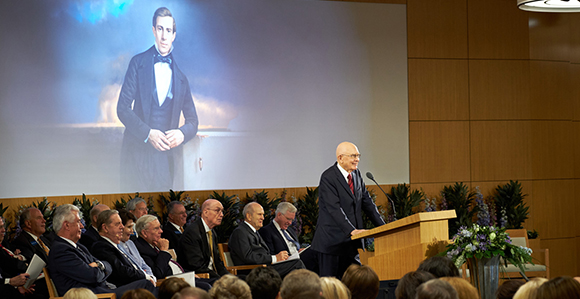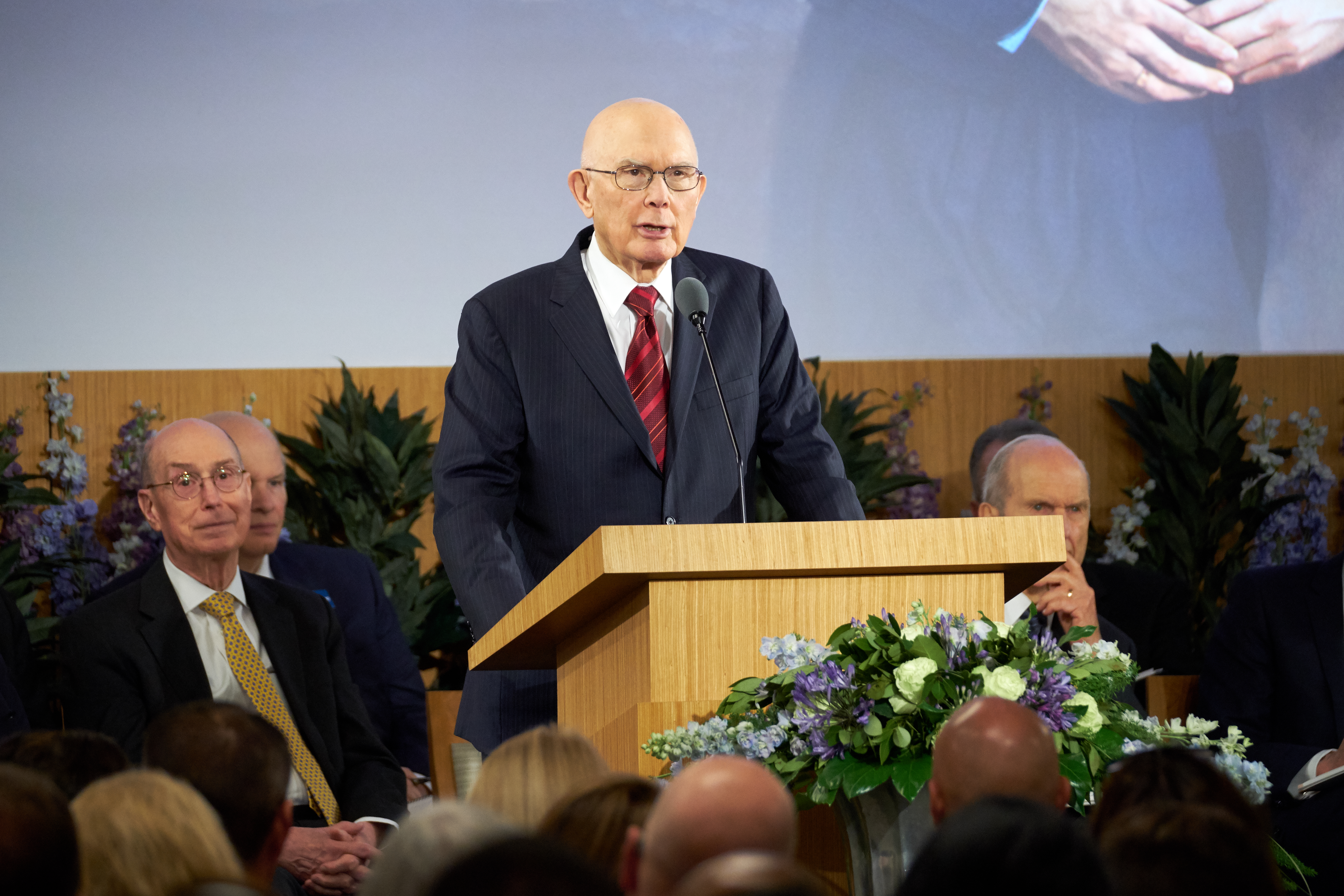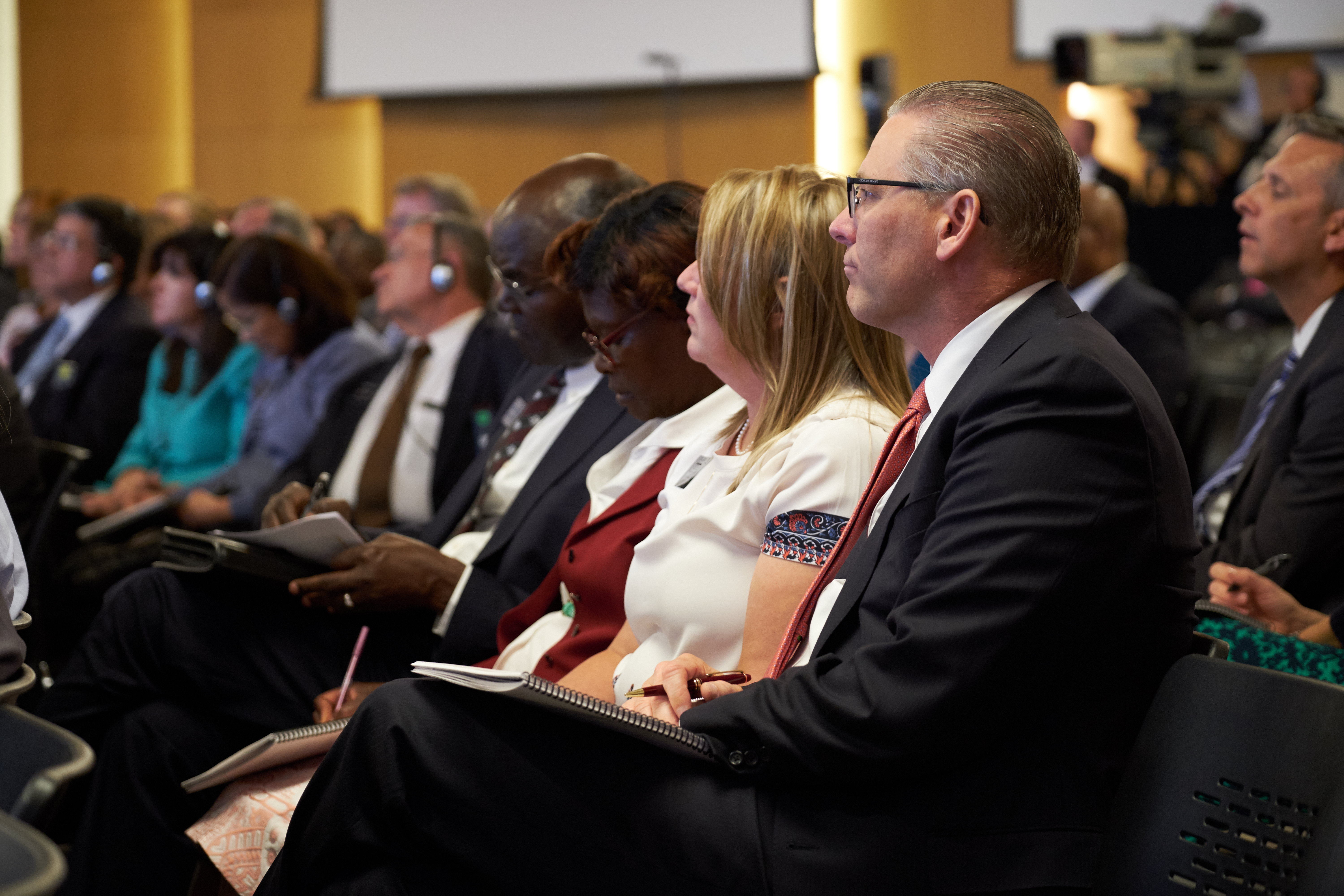President Oaks Says Knowledge, Testimony of Joseph Smith Vital to Missionary Work
Contributed By Scott Taylor, Church News Managing Editor

President Dallin H. Oaks, First Counselor in the First Presidency, speaks at the Mission Leadership Seminar on June 25, 2018.
Article Highlights
- The Lord inspired Joseph Smith to make illuminating and massive additions to Christian doctrine.
- Joseph Smith brought forth the Book of Mormon, the “keystone of our religion.”
- Research has shown Joseph to be an “upstanding and honest citizen.”
“We did not meet Joseph Smith, but we feel we know him, and we love him through what he revealed and taught.” —President Dallin H. Oaks
With the relationship of knowledge and testimony of Joseph Smith vital to missionary work, President Dallin H. Oaks detailed the doctrinal contributions of the Prophet as well as his life and legal challenges in the hopes of strengthening understanding and testimony.
“We all know that some investigators accept the principal doctrines of the gospel but simply cannot accept the fact that a 14-year-old was visited by the Father and the Son and that he translated the Book of Mormon and became the prophet we know him to be,” he said.
President Oaks, the First Counselor in the First Presidency, led off the second day of the 2018 Mission Leadership Seminar on Monday, June 25, at the Provo Missionary Training Center.
Referring to himself as a “65-year student of the life of Joseph Smith” and acknowledging his birth in 1932, when the Church was just over 100 years old, President Oaks said he considered himself typical of the faithful Latter-day Saints of the Church’s second century.
“We did not meet Joseph Smith, but we feel we know him, and we love him through what he revealed and taught. We are witnesses of the truth of the poetic prediction that “millions shall know ‘Brother Joseph.’”
Referring to “the illuminating and massive additions the Lord inspired Joseph Smith to make to Christian doctrine,” President Oaks offered a list of ten, adding that each item was worthy of extensive elaboration.
“Anyone who studies even a small part of this list—whether believer or nonbeliever—must acknowledge that Joseph Smith stands at the headwaters of an immense stream of bold and new religious ideas,” he said. “As we read in Preach My Gospel, the fulness of the gospel was restored to the earth through Joseph Smith.”
- The nature of the Father, the Son, and the Holy Ghost.
- The relative function of these three members of the Godhead and Their relationship to mortal beings.
- The nature of the Fall of man.
- The purpose of mortal life in furtherance of the Father’s plan for His children to attain their eternal destiny.
- The role of the Atonement of Jesus Christ in assuring immortality and providing the opportunity for eternal life.
- The role of earthly and eternal marriage in the Father’s plan.
- The essential role of priesthood and ordinances in the Father’s plan.
- The essential role of proxy ordinances and temples in the Father’s plan.
- The knowledge that God desires to save all of His children and that every person who has lived upon this earth—whether then knowing of Jesus Christ or not—is capable of attaining the highest heaven hereafter.
- The relationship of the three-fold sources of truth about man and the universe: science, scriptures, and continuing revelation.
“You have noted that my list did not specifically mention Joseph’s bringing forth the Book of Mormon, a new volume of scripture that is, of course, the source of many of those new religious ideas,” President Oaks said. “That book deserved special mention. Its title proclaims its most important function: ‘Another Testament of Jesus Christ.’” Joseph Smith declared it the “keystone of our religion.”

President Dallin H. Oaks, First Counselor in the First Presidency, speaks at the Mission Leadership Seminar on June 25, 2018.
Citing a nationwide study where participants considered Latter-day Saints to be secluded, mysterious, and having “weird beliefs,” President Oaks said the respondents knew little if at all on the idea of restoration or reestablishment of original Christian faith.
“These findings remind us that we must not let our missionaries assume too much knowledge about our faith,” he said. “Those they teach may have heard the word ‘Mormon,’ but missionaries must not assume that most have even the most primitive understanding of the basic portions of our faith.”
President Oaks shared some of his personal thoughts about Joseph Smith—that he was a man of the frontier, where men had to pit their brute strength against nature and sometimes each other; that during his 38 and a half years of life, he had more than his share of mortal afflictions; and that he had no mortal role models in spiritual matters from whom he could learn how to be a prophet and leader, instead having to rely on inexperienced associates.
He cited research and scholarly writing done personally and with others from throughout his life, including as a professor at the University of Chicago Law School and as president of Brigham Young University. That research included extensive investigation into the legal and financial matters of Joseph Smith.
President Oaks detailed findings, including the suppression of the Nauvoo Expositor, the little-known trial in Illinois of the five men accused of murdering Joseph Smith, and the business activities of the Prophet in challenging economic times, including charges of fraud against him.
Yet nothing from the research has found anything that reflected any dishonor or moral impropriety on the part of Joseph Smith. From the recently published book Joseph Smith’s Legal Encounters, President Oaks quoted: “As a defendant, he was never convicted of any criminal offense. Whenever he was given a fair hearing, he was found to be an upstanding and honest citizen.”
Read additional stories
President Nelson Shares the “Hopes of My Heart” with New Mission Leaders
Love, Serve, Teach, Baptize, Elder Uchtdorf Tells New Mission Leaders
Elder Cook: Four Ways Missionaries Can Love Others and Deepen Their Conversion
Book of Mormon Is the Most Effective Conversion Tool, Say Elder and Sister Holland
Gospel Study and Holy Ghost Essential to Effective Teaching, Say Elder and Sister Christofferson
Repentance Is Not a Backup Plan; It Is the Plan, Says Elder Andersen
Support and Encouragement Help New Converts Blend with Members, Says Elder Soares
Elder Bednar Shares Five Lessons about the Spirit of Revelation with New Mission Leaders
Seek Divine Assurance to Remove Self Doubts about Service, Says President Eyring
President Ballard Discusses 7 Principles for Finding People to Teach
Elder and Sister Renlund Review the What, Why, and How of Developing Christlike Attributes

Mission presidents and their companions listen to a session during the 2018 Mission Leadership Seminar at the Provo Missionary Training Center June 24–26.

Mission presidents and their companions listen to a session during the 2018 Mission Leadership Seminar at the Provo Missionary Training Center June 24–26.

New mission presidents and their wives get their photo taken in front of a mural at the Provo Missionary Training Center during the 2018 Mission Leadership Seminar held June 24–26, 2018.
